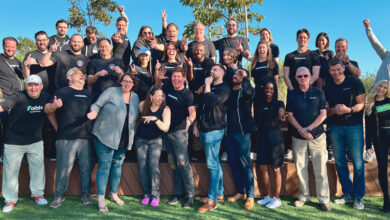Community Building And Values: Key Approaches To Entrepreneurship

Community Building And Values: Key Approaches To Entrepreneurship
In the world of entrepreneurship, the path to success is rarely a straight line. Instead, it’s a journey marked by highs and lows, triumphs and setbacks. With 18% of small businesses not making it past the first year and 65% of businesses failing within 10 years, as the Chamber of Commerce reported, entrepreneurs need to adopt a mindset that will help them weather the inevitable storms they will face.
For successful business owners, one trait stands out above all others: resilience. This isn’t just about bouncing back from failures; it’s about seeing every obstacle as an opportunity to learn, innovate, and grow.
Embracing Challenges As Opportunities
The entrepreneurial landscape is fraught with challenges. Each hurdle, rejection, and failure are integral parts of the journey.
“The key to thriving in the face of challenges lies in how you perceive these obstacles. Do you see them as insurmountable barriers or as chances to improve and innovate? This perspective makes all the difference. Embracing resilience is key to entrepreneurial success. Facing challenges and setbacks is an inevitable part of the journey. Instead of viewing obstacles as insurmountable, see them as opportunities to learn, grow, and innovate. Remember that many successful ventures have emerged from the ashes of failure. Cultivate a mindset of perseverance, adaptability, and continuous learning. Every setback is a step closer to your goal, as long as you’re willing to persist and learn from each experience,” says Claudio Bravo, CEO of Bravo Luxury. Bravo has navigated turbulent waters, from humble beginnings in a small town in Chile to becoming a prominent real estate developer in the Coachella Valley, and can attest to the importance of mindset in the face of challenges.
Some of the most successful ventures have risen from the ashes of what seemed like catastrophic failures. The difference was the mindset of the entrepreneurs behind them. Like other successful entrepreneurs, Bravo has cultivated a mindset of perseverance, adaptability, and continuous learning. In this light, every setback is not a step back but a step closer to your goal – as long as you’re willing to persist and learn from each experience.
Betting On Yourself
Central to this journey is a profound belief in oneself and a foundational trust in one’s abilities and vision. This means investing time, resources, and energy into your ideas and capabilities. “Taking calculated risks is part and parcel of successful entrepreneurship. It’s about believing in your potential to succeed, even when others might have doubts,” says Bravo.
Science Direct research shows a clear link between self-confidence and entrepreneurial success. Bravo’s self-confidence helped him successfully navigate the 2008 housing market crisis. “Self-confidence is not just an internal asset; it’s contagious. It motivates you and inspires confidence in others, including potential investors, partners, and employees,” he says.
So, how can entrepreneurs build this self-confidence? It starts with personal and professional development, which should be ongoing. Entrepreneurs should always find ways to enhance their skills, expand their knowledge, and grow their network. Betting on yourself also means prioritizing self-care. A healthy, balanced entrepreneur is more focused and effective than one running on an empty tank.
Handling Rejection In High-Stakes Investments
One of the most daunting aspects of entrepreneurship is facing rejection, especially when it involves significant financial pursuits. What separates the top entrepreneurs from everyone else is their approach to rejection.
“Each ‘no’ should be viewed not as a door closing but as a stepping stone to a ‘yes.’ It’s essential to seek feedback from these rejections and use it constructively to refine your pitch, business model, or strategy,” he advises.
A report from The Harvard Business Review supports Bravo’s point, claiming that, when asked why promising new ventures fail, most VCs tend to point to the inadequacies of a founder, particularly “their lack of grit, industry acumen, or leadership ability.”
“Remember that investors don’t just invest in an idea – they invest in the person behind it. Demonstrating resilience and an ability to adapt to feedback to build and improve your proposition is crucial for entrepreneurs who want to attract investors
Networking is key in these scenarios; often, a ‘no’ can lead to a new introduction or opportunity.
Moreover, timing can be crucial. A ‘no’ today might become a ‘yes’ when the market or business is more mature. Entrepreneurs must recognize that rejection is not a reflection of their worth but a standard part of the entrepreneurial process,” explains Bravo.
Due to its turbulent nature, the entrepreneurial journey is not for the faint of heart. It requires a combination of resilience, self-belief, and the ability to view setbacks as opportunities.
Betting on yourself, embracing continuous learning, and handling rejections with grace and determination are the hallmarks of successful entrepreneur. Remember, every challenge faced is a lesson learned, and every setback is a setup for a comeback. Keep pushing forward, never give up, and watch your entrepreneurial dreams become a reality.



